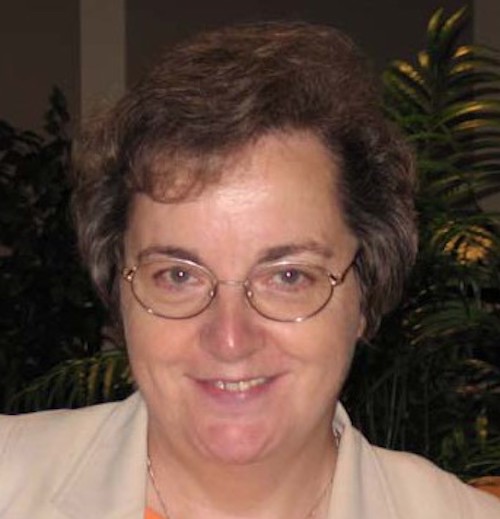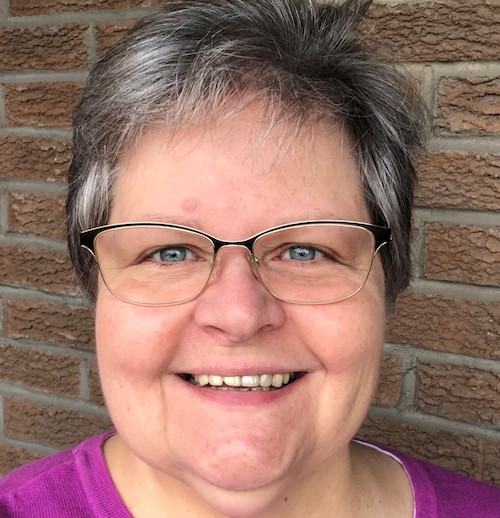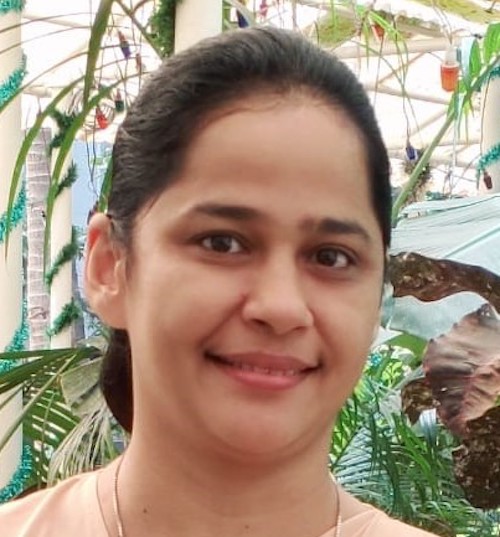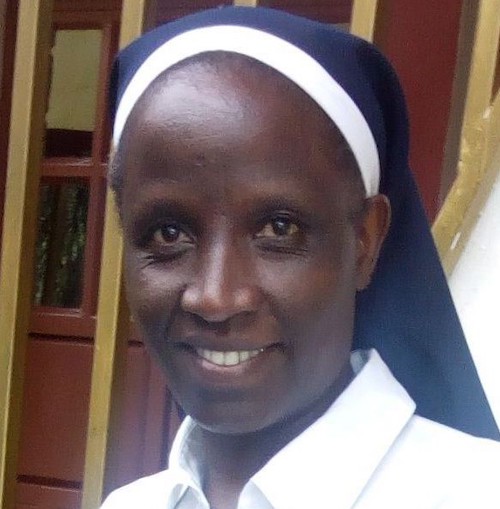
A carpet of spring flowers in the woods says, in the words of John O'Donohue, that "the symphony of renewal is no longer reversible." (Deirdre Mullan)

(GSR logo/Toni-Ann Ortiz)
In light of the promise of Easter and considering what they and the world have been through this year with the pandemic and social unrest, the panelists this month reflected on this question:
How does Jesus' promise of everlasting life resonate with you during this time of great individual and collective loss because of the pandemic? How do you keep your faith and bolster it in others?
 Deirdre Mullan is a Sister of Mercy from Ireland. At the height of unrest in Northern Ireland, Mullan spent 25 years as a teacher and administrator in schools. With a doctoral degree in the feminization of poverty, she has long been active in promoting the education of girls. She served as the executive director of Mercy Global Concern at the United Nations for more than 10 years, later directing the Partnership for Global Justice, a network of over 125 small congregations at the U.N. Her present ministry is with UNICEF, the United Nations Children's Fund, seeking ways to partner with religious communities.
Deirdre Mullan is a Sister of Mercy from Ireland. At the height of unrest in Northern Ireland, Mullan spent 25 years as a teacher and administrator in schools. With a doctoral degree in the feminization of poverty, she has long been active in promoting the education of girls. She served as the executive director of Mercy Global Concern at the United Nations for more than 10 years, later directing the Partnership for Global Justice, a network of over 125 small congregations at the U.N. Her present ministry is with UNICEF, the United Nations Children's Fund, seeking ways to partner with religious communities.
"COVID-19 has revealed fundamental truths about what it is to be human and to share our lives with others. From pandemics to climate change and nuclear weapons — the world needs to find shared solutions to shared challenges."
—Mary Robinson
As the stark reality of the global pandemic began to infiltrate our daily lives and as restrictions for the sake of the common good were put in place, life for each one of us took on a new rhythm.
I committed to doing what my Irish dad said so often: "Go out into nature, breathe, because creation is a soothing balm for anxious bodies." And so, every day since the pandemic began, I made the commitment to go out and look at and listen to God's artistry, which is all around us.
The motto I took when I made my profession has become very prominent for me during this time: "Be still and know that I am God" (Psalm 46:11), an invitation to delve deeper into the stillness around. As humans, we have a propensity to see and not see. The noisy worlds in which we coexist with nature too often drown out the sounds and music of nature.
Some days, I found myself sitting at a fishpond and marveling at the various breeds of fish — their colors and how they swish and splash, hide and emerge from behind magnificent water lilies. In this small space, I found evidence of God's masterpieces as the yellow, green, red, striped and black fish danced and waltzed in and out of the vegetation.
Within the grip of this dark winter in which we currently find ourselves, it can become impossible to imagine the spring. Irish poet John O'Donohue reminds us:
Winter is the oldest season; it has some quality of the absolute. Yet beneath the surface of winter, the miracle of spring is already in preparation; the cold is relenting; seeds are wakening up. Colours are beginning to imagine how they will return. Then, imperceptibly, somewhere one bud opens and the symphony of renewal is no longer reversible. From the black heart of winter a miraculous, breathing plenitude of colour emerges.
During this time, I place my congregational directory before me, and every day, I page through it and send a note with a picture from my ramblings to those who are bereaved, ill or suffering from anxiety, despair or longing, with the message: "Night never has the last word; the dawn is invincible."
 Stephanie Romiti is a Sister of St. Joseph of Sault Ste. Marie, Ontario, Canada. Her academic training was in education, and she spent more than 30 years in Catholic education in the United States and Canada as a teacher, principal and religious educator and in faith formation. Since obtaining a graduate degree in Christian spirituality with certification in spiritual direction and directed retreats, she has served as retreat and spiritual director both in person and via digital platforms. Stephanie enjoys nature photography, music and creative arts and often incorporates these in ministry.
Stephanie Romiti is a Sister of St. Joseph of Sault Ste. Marie, Ontario, Canada. Her academic training was in education, and she spent more than 30 years in Catholic education in the United States and Canada as a teacher, principal and religious educator and in faith formation. Since obtaining a graduate degree in Christian spirituality with certification in spiritual direction and directed retreats, she has served as retreat and spiritual director both in person and via digital platforms. Stephanie enjoys nature photography, music and creative arts and often incorporates these in ministry.
"I can't wait for life to get back to normal!"
I understand the sentiment of this statement, which I have heard often lately. Life has been anything but normal during this pandemic, but do we really want to go back?
This past year has exposed many inequities and injustices in our world: unacceptable conditions in many long-term care homes, poverty and food insecurity, homelessness, the increased prevalence of domestic and drug abuse, and more.
On a more positive note, this experience has led people to reevaluate their lives. Some have discovered, for the first time ever, the gift of solitude and a quieter pace of life. For others, being separated from loved ones has heightened the priority of family and the longing to be together. Still others are reaching out in socially distanced ways to those in need. Virtual technology has brought people together from all parts of the world.
I recently heard Johannine scholar Presentation Sr. Mary Coloe refer to "eternity life" rather than eternal life. She explained that "eternity life" brings to our attention a new quality of life, not simply a continuation of this life. May we take this to heart, learn from the shortcomings of our past and, with the grace of God, participate in changing the world for the better.
My prayer is that we don't merely attempt to go back to normal, but rather that we help to shape a new normal based on the Gospel. After all, Jesus wasn't resuscitated back to his former life but was resurrected to new life. The words from Jeremiah 29:11 are a reminder of God's promise: "For I, the Lord, know well the plans I have in mind for you, plans for your welfare and not for harm, to give you a future with hope."
This future begins with our next breath. I believe this is the "eternity life" that Easter promises.

The words from Jeremiah 29:11 are a reminder of God's promise: "For I, the Lord, know well the plans I have in mind for you, plans for your welfare and not for harm, to give you a future with hope." (Stephanie Romiti)
 Dr. Beena Madhavath is a member of the Congregation of Ursulines of Mary Immaculate from India. Her medical degree is in obstetrics and gynecology, and she has served as the medical superintendent, deputy director, consultant gynecologist and teacher at Holy Family Hospital in Mumbai, India. She is the provincial councilor for medical apostolate of her province, the national president of the Sister Doctors Forum of India, and a board member of the Catholic Bishops' Conference of India-Coalition for AIDS and Related Diseases and India's Christian Coalition for Health.
Dr. Beena Madhavath is a member of the Congregation of Ursulines of Mary Immaculate from India. Her medical degree is in obstetrics and gynecology, and she has served as the medical superintendent, deputy director, consultant gynecologist and teacher at Holy Family Hospital in Mumbai, India. She is the provincial councilor for medical apostolate of her province, the national president of the Sister Doctors Forum of India, and a board member of the Catholic Bishops' Conference of India-Coalition for AIDS and Related Diseases and India's Christian Coalition for Health.
Sickness, suffering, death and loss are universal realities. These are also events in life over which people do not have much control.
The COVID-19 pandemic has reminded us of the vulnerability of life and fragility of human existence. During this crisis, people asked fundamental questions about the meaning of life and existence. COVID-19 has aggravated such moments of self-doubt and confusion.
From time immemorial, suffering remained always a mystery for us human beings. Even today, it continues to be a mysterious reality beyond our comprehension. Most world religions and philosophies try to find meaning in suffering. All through the Bible, we can see glimpses of the people of God trying to find meaning in the midst of suffering. We see it in the books of Genesis, Exodus, Job, Psalms, Prophets, and in the New Testament up to Revelation, including in the lives of Jesus and his disciples. Jesus through his passion, death and resurrection set an example of the redemptive value of suffering.
During the Lenten season and Holy Week, this is what we commemorate, and it gives us hope. In the midst of all the suffering and uncertainties of COVID-19, this Christian perspective of suffering can give hope for all people. For us who are involved in the Christian health care mission, the pandemic has provided many moments of grace and hope, including new possibilities and paths for advancing this core value of the original healing mission of Jesus.
We could identify the suffering face of Christ in those who were affected by the coronavirus, both patients and their loved ones. It was also an opportunity for us to become the compassionate face of Christ while accompanying them during their time of pain, loneliness and loss. To be sowers of this prophetic hope was a joyful as well as a challenging experience.
Advertisement
 Agnes Musemba Mativo is a Kenyan member of the Religious Sisters of Mercy. Her ministries have included social work with HIV/AIDS patients in Zambia and in mission advancement at a Mercy hospital. She pursued studies in clinical psychology at the Pontifical Gregorian University in Rome and teaches psychology in two Catholic institutions. Currently, she works with men and women in formation as well as priests and religious, teaching and in psychological accompaniment. She has served as postulant mistress and continues as vocation promoter for her own congregation.
Agnes Musemba Mativo is a Kenyan member of the Religious Sisters of Mercy. Her ministries have included social work with HIV/AIDS patients in Zambia and in mission advancement at a Mercy hospital. She pursued studies in clinical psychology at the Pontifical Gregorian University in Rome and teaches psychology in two Catholic institutions. Currently, she works with men and women in formation as well as priests and religious, teaching and in psychological accompaniment. She has served as postulant mistress and continues as vocation promoter for her own congregation.
Faith is the utmost trust in someone or something even when little is known. It denotes a strong belief in God, doctrine or religion even when at times this tends to overshadow reality. Reflecting on the promise of everlasting life, how do we hold our faith as we look at the collective loss during this time of pandemic?
Dietrich Bonhoeffer once said that nothing can fill the gap of a loved one who passes on, and I think it is unrealistic to try to find anything to put in that space. Painful as it might be, the bitter reality is that each person mourning a loved one has to bravely walk the road of healing each day and learn to live with the void created by the loss without looking for a substitute. I feel when we leave the gap unfilled somehow it preserves the bond of love between us and the dead person — in hope of the resurrection, as our faith informs us.
Death is such a mystery that it can never be fully comprehended with our human mind, and so in our efforts to understand it, we sometimes try to fill the gap it creates with endless questions. Having faced the death of my brother recently, I have the conviction that my inner healing shall be achieved by allowing myself to leave that space empty so that my communion with him and other loved ones may be kept alive, even at the cost of deep pain.

Sr. Agnes Musembo Mativo and her siblings pray for the soul of their departed brother, Francis Sila Mativo, at his funeral. (Courtesy of Agnes Musembo Mativo and family)
For me, this is where faith comes in: a belief that death is not the end, but the beginning of new life — the Everlasting Life, where we shall meet face to face with God and our departed ones.
As we reflect on life after death, we come to appreciate that grief and gratitude are kindred souls, each pointing to the beauty of what is temporary and given to us by God. At the same time, we begin to look at the reality of the earthly life with new eyes that are not focused on the transient things, but on the eternal.
Belief in everlasting life doesn't mean that I fully understand everything, but I am allowing my little faith to lead me on. Faith remains faith even when it is challenged by occasional doubts. There is always great consolation when we try to find meaning in the reality of death. When we go through grief, sometimes we need to pause and, with eyes of faith, look out for the silver lining hidden in the cloud of mourning.
For all those going through grief at this time, may God be near to them, and when they feel grief's desolation and loneliness, may he shine in the dark spaces of their emptiness and sadness. May they have the grace to allow their little faith to lead them on to the belief of a life never-ending: the Everlasting Life. Amen.
 Kathryn Keigher is from England, a member of the Institute of the Blessed Virgin Mary (Loreto Sisters). Most of her ministry was spent teaching English and religious education in secondary school and college, but she taught English in Romania over the holidays. She also served at a Loreto mission in Bolivia for four years. She is the justice, peace and integrity of creation coordinator for her region and schools and worked for several months at the congregation's nongovernmental organization office in New York. She does volunteer work teaching English as a second language.
Kathryn Keigher is from England, a member of the Institute of the Blessed Virgin Mary (Loreto Sisters). Most of her ministry was spent teaching English and religious education in secondary school and college, but she taught English in Romania over the holidays. She also served at a Loreto mission in Bolivia for four years. She is the justice, peace and integrity of creation coordinator for her region and schools and worked for several months at the congregation's nongovernmental organization office in New York. She does volunteer work teaching English as a second language.
For the past year, we have all become familiar with scenes like the one depicted here — empty chairs at empty tables — in our homes, our communities, our churches, schools, workplaces, towns and cities. Fear, separation, isolation, death and depression have become familiar experiences. They are always part of life. But few of us have experienced them all at the same time and relentlessly. Until March 2020.

Left: An empty picnic table; Right: Cafe owner Cheryl has no customers; Below: A sign from National Health Service points toward a COVID-19 vaccination site (Kathryn Keigher)
The recent international rugby match between Wales and Ireland was played in an empty stadium. But the dignity with which both teams sang their national anthems was tangible, even over the technological devices that both separated and connected us. I was not born in either of these countries, but both national anthems are dear to me, and as I joined the singing, I was reminded that it is often when we are really stretched emotionally that we reach deep within ourselves. In the ridiculous image of rugby players singing in an empty stadium, I saw pride and determination despite all the odds.
So where is God in this landscape? Right in the middle, of course.
When Elijah sought God on the mountain, he found him in the light, gentle breeze (1 Kings 19:11-18).
My strength in this pandemic has been in discovering God in the gentle breeze (even while surrounded by drama and destruction), in the simple and the obvious: a smile, a generous offer of help, a phone call, an email, all signs of mutual support of family and friends. And unexpected strangers who become friends, like Cheryl in the photo, who is waiting patiently in her little café where the chairs and tables are empty.
The paschal mystery symbolizes in many ways what this year is about and what life is about. As we commemorate the last days of Christ's earthly life, we can see more clearly the bewilderment and disbelief of the disciples at the way their lives change suddenly. The known, secure certainties of their lives are violently removed. Something similar was happening to us as we approached Easter last year and, with the disciples, we could not have imagined the way our lives would change.
But Easter is a time of triumph. In the light of dawn something wonderful had happened.
"Let him easter in us, be a dayspring to the dimness of us, be a crimson-cresseted east"
— Gerard Manley Hopkins, "The Wreck of the Deutschland"

Easter is a time of triumph. In the light of dawn, it was seen that something wonderful had happened. (Unsplash/Oswaldo Martinez)







